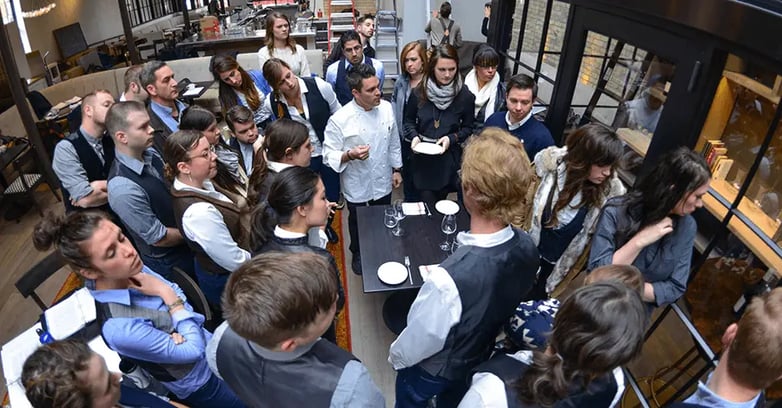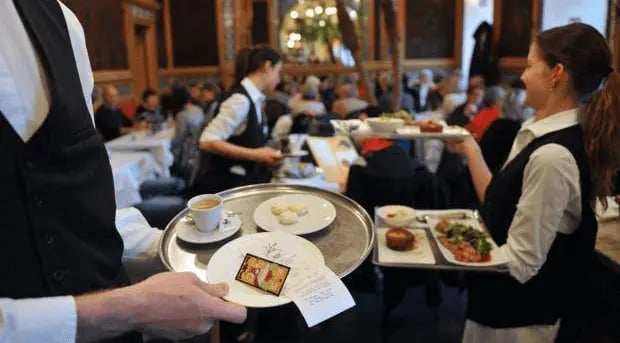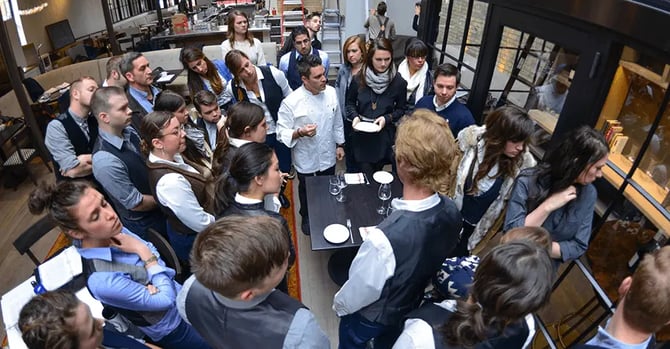A good company culture, and core values, are something that started in corporate America in the 80s, and have since expanded into the entire professional field. Many think of added perks in the workplace when trying to picture creating a happier work environment, but restaurants are in reality a whole different beast.
Obviously, you can’t have a bring your dog to work day, but you can get even more creative if you want to create fun. But it will take much more than fun in order to create real restaurant core values, felt by all employees, and last in the workplace.
Culture itself can be a tricky word to identify, so below we’ll target a few ways that restaurants can not only target what this means but also establish it effectively.

What is Restaurant Company Culture?
In a recent survey conducted by Deloitte’s Human Capital, it was found that roughly 86% of employees viewed culture as an important part of the business. Most importantly, Deloitte found that only 28% of employees said they understood their company’s culture!
How can any company, restaurant, or corporate, expect to deliver on their system of values if it is not widely understood? In order to establish these guiding principles, one must truly understand company culture at its core.
Culture itself is accepted behavior, and the values and belief systems that promote these behaviors. If you want to build a successful restaurant, this needs to be understood clearly. Many restaurants attempt superficial changes like the small added perks mentioned above, but it must be understood that culture lies in a deeper place than this.
With restaurants, culture must be all the more clear. Culture isn’t just a definition either, it’s what’s worn on your employees' faces as they hit the floor and greet guests, it’s in the way your managers coach your servers, it’s in your kitchen environment.
Culture can also be defined as a symbiotic web of seamless interaction; a place where everyone relies on everyone to get the job done well. Simply put, if there is not a central purpose to what everyone is doing, why do it well?
Culture is that purpose, it is that system of values that everyone understands and believes in.
Most importantly, it shows! Customers pick up on this and can really tell if your restaurant lacks cohesion. That's why culture is an essential part of managing a restaurant.
Now we’ll discuss how you can identify your values and how you can expect to promote them.
Establishing Values
As an owner or sole proprietor of a restaurant, it’s up to you to decide what is most important to promote. You need to decide what is most important to the business, how you want to conduct business, and how you expect employees to interact with each other and guests.
Make sure that you do not just create rules of conduct! Try to keep things simple and generate around three to five core values. It’s also vital that you avoid picking values that outside of what your employees view as important.
Find a healthy balance in creating core values, but try to gauge what your employees find worthwhile. This could be done via survey, as many surveys are simple, electronic, and most importantly discreet. This allows people to be honest, so you can ensure that any answers are not simply ones they want you to hear.
The best way to create core values is to get your managers and servers together to come up with values, then meet with managers later to implement any ideas you may have.
Depending on restaurant size, you may want to just get everyone together and create them as a team. Just remember, that even though this is a collective creation, it is up to you to ultimately decide the value system. After all, this is the direction of your restaurant!
Creating Core Values
Create concrete core values, such as accountability. Avoid simply describing general statements, like “not being late” and “showing up for your shift”. These are all great things to embrace (and should be), but they just aren’t simplified enough.
If your goals are not as simple as possible, people will not want to follow them. Another core value could be attentiveness. This is an excellent example of something to use in the service industry, however many restaurants tend to give general statements like “don’t ignore the customer”, and “pay attention to the quality of your work”.
These are both useful but do not serve as a good system of core values.
The first point of not ignoring the customer highlights the first issue, which is the use of negatives. Negatives signify a rule that is to be followed, instead of a belief that is to be embraced. How can you expect people to get on board with restaurant culture if all you have are rules that are not to be broken? Not many people appreciate this kind of environment, and if you instill this you will eventually push a lot of good workers away.
The second point of paying attention to your work is very fitting and actually serves the original goal of creating value splendidly, but falls into the category of supporting solutions for culture.

Supporting Culture
After creating three to five core values that you want to embrace, brainstorm fundamental ways in which you can collectively achieve them.
Depending on your restaurant, you may want to sit down with all of your employees and go over this or rely on middle management to develop these values with the rest of the team. Whatever the case, your restaurant team needs to include up to five ways you can adhere to each value.
This can range from such examples as “greeting tables within 2 minutes of seating”, to “generating and posting employee schedules by noon every Friday”.
Goals should be for all tiers of the restaurant and can be wide-ranging. Say timeliness is a value you want to promote - don’t just promote it on the floor. It also involves greeting times at the door, typing in orders in the back of the house, all the way to kitchen cook times.
If you really want to create an environment that fosters creativity yet stresses the timeliness of service, no area of the restaurant should be overlooked. The most effective method of establishing service values throughout your restaurant while still focusing in-depth on each department is to generate differing support solutions per department.
Keep the values the same, but have every department come up with their own core values. Get creative and ask everyone for their opinion! Developing culture can at the same time develop cohesion if done correctly.
Make sure that everyone is heard, and that multiple levels within your restaurant can develop solutions. If your team feels that they are part of the value development process, they are more likely to not only follow them but promote them.
More importantly, if you can get your most valuable, hardworking employees on board with said creative values, they will train others. However, this is not always a given, and you should ensure other ways of training employees on service values.
Making Values Function in the Everyday Restaurant Environment
Once you’ve established a working system of values, you now have the underlying base for what constitutes your culture. Now it just needs to be put into action.
In order for these values to be put into action, there will need to be a way of enforcing the supporting solutions you collectively came up with. Enforcing values and the solutions behind them, simply means holding everyone accountable.
There needs to be a system of discipline behind any restaurant, and many choose to have prospective employees read the employee handbook before moving forward with the process.
A handbook can be a great way of having core values in writing and make it clear to employees that this is what is expected of them. The end goal is to hold people accountable, while main them want to achieve what you’ve collectively created. The finished product of the service should be something that everyone will want to be a part of, and something that once finished is something to be proud of. Pride bolsters the system of belief!
Conclusion
Culture is something that often takes time to develop. While establishing values and ways that each part of the restaurant can uphold them is crucial to making this happen, culture’s true test is time. It should be something that not only will you want to establish but are willing to constantly work toward.
This is not achieved in a week, a month, sometimes even in a year. Mistakes happen and some values that you may have thought were effective are not working. Whatever the case, stay the course, listen to your employees, and be honest and upfront about what your expectations are for the restaurant and of them.
















-1.png?width=1812&height=1072&name=TripAdvisor%20%26%20More%20Bookings%20(1)-1.png)
-2.png?width=1812&height=1072&name=Google%20Bookings%20(1)-2.png)
%20(1).webp?width=200&name=Eat%20(53)%20(1).webp)
%20(1).webp?width=200&name=Eat%20(15)%20(1).webp)
-1.png?width=200&name=TripAdvisor%20%26%20More%20Bookings%20(1)-1.png)
-2.png?width=200&name=Google%20Bookings%20(1)-2.png)
-1.png?width=200&name=Instagram%20Bookings%20(1)-1.png)
-1-png.webp?width=200&name=Facebook%20Integration%20Rectangle%20(1)-1-png.webp)







.webp?width=200&name=download%20(1).webp)
%20(1)-2.webp?width=200&name=Eat%20(34)%20(1)-2.webp)
%20(1)-2.webp?width=200&name=Eat%20(18)%20(1)-2.webp)













.webp?width=144&height=72&name=Eat%20App%20Logo%20(3).webp)